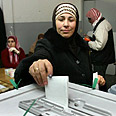
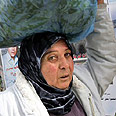
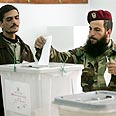
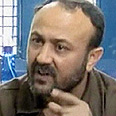
"I hope that the minority will accept the decisions of the majority," Qureia said after voting in the Jerusalem suburb of Abu Dis. "If Hamas wins, they will win and we will stand behind them. This is democracy and we accept the results of the elections."
Elsewhere, Hamas' top candidate, Ismail Haniya, voted in Gaza and declared "the movement would not disarm after entering Parliament."
Palestinian leader Mahmoud Abbas said Wednesday's elections were proceeding smoothly and praised his people for overcoming great obstacles to carry out the vote.
"We are so happy with this election festival," Abbas said after casting his ballot. "So far, it's going very well and we hope it will keep going well until the end without any troubles."
More than million eligible voters
Despite attempts to disrupt or postpone them, and amid doubts voiced by commentators and politicians, the Palestinian Authority general elections got under way at 7 a.m. Wednesday, as scheduled.
As of 11 a.m., 20 percent of eligible voters cast their ballots.
Palestinias will be voting in 2,721 polling stations, which will be positioned in 1,008 election centers in the West Bank and Gaza.
Meanwhile, PA security forces in Gaza's Shati refugee camp recovered candidate lists distributed by both Hamas and Fatah members near polling stations, in violation of the law.
Some 1,340,000 Palestinians are eligible to vote, including 49,310 residents of east Jerusalem. After a difficult decision making process, Israel decided to allow east Jerusalem residents to take part in the elections in post offices or in other ballot centers in the Palestinian Authority, on the same basis as the 1996 PA elections.
Polling stations opened around 7 a.m. and will close at 7 p.m.
Officially, no results will be released before Friday afternoon, but party headquarters are expected to give their estimations of voting results by Thursday morning.
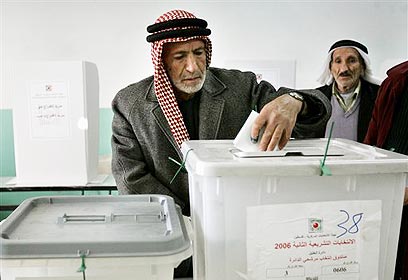
Palestinian casting his vote in the village of Halhul (Photo: AP)
Around 20,000 clerks will staff the polling stations, alongside thousands of monitors from various organizations in the territories and from abroad.
Leading the foreign observers is former U.S. president Jimmy Carter.
Every voter will submit two ballots – one marked with a "national" list, and the other with a vote for a local candidate.
Candidates will choose between 11 party lists, which will compete for half of the 132 seats in the Palestinian parliament. The second half of seats will be competed for directly by 414 candidates, some of whom represent parties, and some of whom are independent.
Every district in the PA will have a number of representatives assigned to it, proportional to its size.
The Hamas trap
Unlike the '96 elections, this time Hamas has joined the political game. During the campaign it has held its fire and projected relative moderation, and polls showed a narrowing of the gap between Hamas and Fatah, the ruling party.
Chief of Staff Dan Halutz said Tuesday that he believed Hamas would reach a position in which it could join the ruling establishment in the Authority. He warned that a policy has yet to be formed about dealing with such an event.
During the Knesset's Foreign Affairs and Defense Committee meeting, a senior intelligence official predicted that Fatah would beat Hamas in election results by seven percent.
Acting Prime Minister Ehud Olmert took advantage of his speech in Herzliya in order to call on Palestinians not to choose those "who led them from failure to failure."
He added, however, that he was not joining the "doomsday" predictors of events after the elections, and added that Israel could meet the challenges.
Messages from Washington indicated that the U.S. government would not change its policy, classifying Hamas as a terrorist organization.
In addition to Fatah and Hamas, which is represented in the party list as the "Change and Reform" party, a number of left wing parties are running, such as the "Third Way," headed by PA Finance Minister Salam Fayad, and Palestinian parliament member Hanan Ashrawi.
13,000 to police elections
The PA has announced a state of alert among all PA security forces, who have already voted in the elections during the week, and who will police the ballots.
Some 13,000 police officers have been drafted for the mission, and Israel has allowed them to carry weapons in area A, as well as some regions in area B.
Except for the Islamic Jihad, which is boycotting the elections, seven armed Palestinian factions have signed an agreement promising to avoid violence around the elections.
The IDF and Israel Police have also entered a state of alert ahead of the elections, out of concern that rejectionist elements will try to create provocations through terrorist attacks.
The PA elections, which the U.S. government regards as highly important in the democratization of the entire Middle East, is attracting global attention.
Around 800 foreign journalists poured into PA territory in recent days in order to document the democratic process. Arab satellite stations are expected to broadcast continuous coverage from the territories, and presenters have arrived from abroad to cover the elections.
Ilan Marciano, Ronny Sofer, Efrat Weiss and AP contributed to the report















